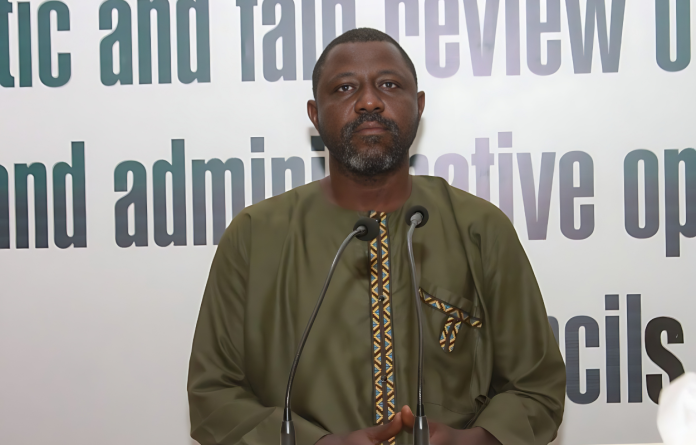By Makutu Manneh
Ebrima K. Jobarteh, a senior revenue collector at the Brikama Area Council (BAC), has informed members of the Local Government Commission of Inquiry (LGCI) that as revenue collectors, they use their own imagination to evaluate the revenue they collect.
Mr. Jobarteh made this disclosure while testifying as a witness before Commissioners of the LGCI yesterday Monday, 18 March 2024.
According to the witness, he was the revenue collector for BAC in-charge of the Brufut Zone from 2017 to 2018, for properties valued at five hundred thousand Dalasi and above. He said commercial properties pay five thousand Dalasi (D5,000) while residential properties pay two thousand Dalasi (D2,000). He said they were given a threshold of hundred thousand Dalasi.
“We use our imagination to evaluate what to collect from these properties,” the witness said. He, however, agreed with Chairperson Jainaba Bah that what they do is a mere estimation and not evaluation. The witness also informed the Commission that he does not go with any certified person to do property evaluation, but goes alone.
Commissioner Alagie Sillah, in his interjection, asked the witness: “Are you telling us that you do not have baseline data for the West Coast Region for the properties you value?”
The witness replied in the negative and said he does not have them, adding that they do not have a plan showing all the properties in the West Coast Region.
“Is it like you wake up in the morning and start billing people?” Commissioner Sillah asked. The witness however did not respond to this question.
Vice Chairperson of the Commission Samba Faal asked the witness to explain the basis of their assessment and certain regulations including the Rating Act, but the witness replied that they assess compounds but he does not know about the regulations.
Jobarteh continued that they use a fixed rate for residential properties (0.040) which gives an amount of D2,000 and also a fixed rate for commercial properties (0.010), which amounts to D5,000.
“What is happening now is that you are doing it arbitrarily. Once the property is valued, it is placed at the Council to enable people to petition against it, if they have issues to raise. And after three months, it becomes fixed. That is the right process. In doing what you are doing which is arbitrary, you are also losing revenue,” Commissioner Faal said.
On the shortages in the witness’s revenue collection, he told the Commission that most of his shortages happened in 2020 which he described as a terrible year for him.
“I was sick and also having family pressures because I was not doing my responsibility as a father. This was why I used these monies for my treatment and on my family,” he said.
Counsel Gomez told him that saying he was sick was not true because he was mostly getting shortages even before 2020, and these are visible in his cashbook.
Jobarteh responded that it is not just for ‘‘my sickness but also for my family.’’
‘‘You know responsibility is very high. We all have responsibilities but should that be the reason why we must take public money?” Counsel Gomez asked the witness. Counsel Gomez continued and asked him if he had applied for sick leave, but the witness responded in the negative and said he was going to work because he was not bedridden, but was not going to work when it disturbed him. He said his manager was aware of his sickness because when he could not go to work, he always informed him.
Commissioners noted that in 2022, the witness recorded a shortage of two hundred and ten thousand, six hundred and nineteen Dalasi, eighty-five Butut (D210,619.85).
The witness admitted and said he has begun repaying the sum. He said the money was spent on his medical bills and on his family. Counsel Gomez asked him how this was possible because the Brikama Area Council had a digitised revenue collection system and whatever he collected, would show in the system and they could know how much he deposited.
“I deposit, but I do not deposit all,” the witness said. The witness said he was surprised with the figures the auditors claimed but when they reconciled, he realised that the internal auditors were right. He was asked about forty-six thousand Dalasi (D46,000) and twenty-six thousand, Four Hundred Dalasi (D26,400) collection he made without depositing it in the bank account. The witness said the D46,000 was a mistake by the auditors because the amount should have read twenty-nine thousand Dalasi (D29,000). The witness provided bank deposit receipts to support his claim that the amount should have been D29,000 instead of D46,000 as queried by the internal auditors.
“Why did you deposit less than you collected?” Counsel Patrick Gomez asked the witness again.
“I do not mean to do it definitely, but because of conditions,” the witness responded.
Counsel Gomez told the witness that he used to collect revenue for three months without depositing them in the account. The witness insisted that the funds were deposited.
To confront him on his claim, the witness was shown his cash book where he noted that from April to June 2019, he did not go for auditing.
“Mr Jobarteh, it is correct that using the monies you collected on your private affairs is wrong,” Counsel Gomez told the witness.
“It is very wrong,” the witness answered.
The witness wrote two statements during investigations and they were both tendered and admitted as evidence. One of the statements was dated 9th November 2023 and the other was dated 12th March 2024, and attached were some copies of Trust Bank receipts of deposits into the Brikama Area Council (BAC) accounts.
According to Jobarteh, he completed senior secondary school education in 1999 and began work at the Kuntaur Area Council the following year, 2000. He said he was moved from Kuntaur Area Council to BAC in 2009 as senior revenue collector, a position he holds until now.


















